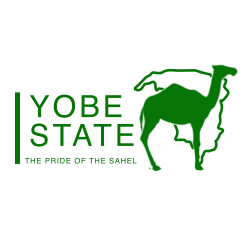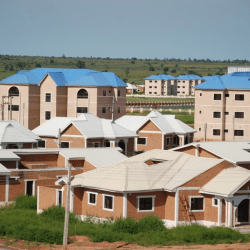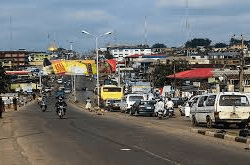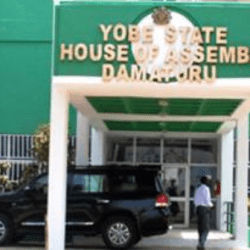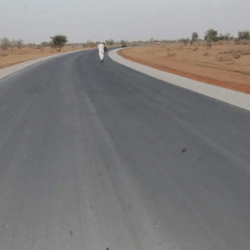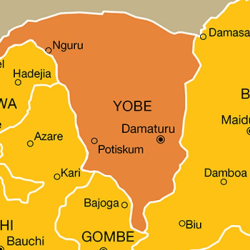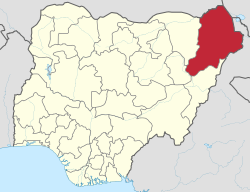Since 1991, Yobe has been led by many chief executives – military and civilian – who, in various ways, have all strove to give meaning to the state’s founding objectives.
| NAME | FROM | TO |
| COMPOL Sani Daura Ahmed | 27/08/91 | 2/1/92 |
| Alh. Bukar Abba Ibrahim | 2/1/92 | 17/11/93 |
| COMPOL Wadi Ali (Acting) | 17/11/93 | 14/12/93 |
| The late COMPOL Dabo Aliyu | 14/12/93 | 14/8/96 |
| Group Capt. J. I. Ben – Kalio | 14/8/96 | 14/8/98 |
| Col. Musa Mohammed | 14/8/98 | 29/5/99 |
| Alh. Bukar Abba Ibrahim | 29/5/99 | 29/5/2003 |
| Alh. Bukar Abba Ibrahim | 29/5/2003 | 29/5/2007 |
| Senator Mamman Bello Ali | 29/5/2007 | 27/1/2009 |
| Alhaji Ibrahim Gaidam | 27/1/2009 | 28/05/2011 |
| Alhaji [Dr.] Ibrahim Gaidam | 29/05/2011 | 25/05/2019 |
| Hon. Mai Mala Buni | 29/5/2019 |
Yobe
Yobe, a State in Nigeria, was carved out of the old Borno State. Yobe State derives its name from River Yobe.


The state was created as a state on 27th August1991, by the then President of the country, General Ibrahim Badamasi Babangida.

It was the culmination of years of effort by many people whose objective was to ensure accelerated and sustainable socio-economic development across the areas and communities that make up the state.



Yobe has a political structure comprising of 17 local government councils and 178 wards. It also has 14 emirate councils. Its capital is Damaturu. The State covers an estimated area of 47,153 square kilometers and shares borders with Borno State to the east, Gombe State to the south, Bauchi State to the west, Jigawa State to the north-west, and has an international border to the north with Niger Republic.

Since 1991, Yobe has been led by many chief executives – military and civilian – who, in various ways, have all strove to give meaning to the state’s founding objectives.



According to the 2006 national population head count, Yobe has an estimated population of 2.6 million people.
It has many culturally distinct but homogenous ethnic groups. These include Manga, Kanuri, Fulani, Karai-Karai, Ngamo, Ngizim, Bade, Maga, and Babur – groups that have existed and lived together since medieval times.

The state is home to the famous Dufuna Canoe, a historic artefact that was carbon-dated to have existed for over 8500 years. The canoe was discovered in 1987 by a Fulani herdsman in Dufuna village of Fune Local Government Area of the state. Currently under restoration by the National Council for Museums and Monuments in collaboration with the state government, the Dufuna Canoe remains an important tourist attraction to the state.

Yobe is also blessed with vast agricultural land that supports farming activities and provides a means of livelihood for most people in the state. With support from successive administrations, Yobe’s agric sector has been transformed in many ways over the years.

Education, the saying goes, is the currency of today’s economy; and given its central role as a catalyst for development, the sector has received priority attention from various administrations in the state. Today, Yobe boasts of eight state-owned tertiary institutions, three federal tertiary institutions, and numerous public and private primary and secondary schools.
The government’s scholarships scheme for students in tertiary institutions both within and outside the country also continues to wax stronger. In January 2021, 233 male and female students were sponsored by the Mai Mala Buni administration to study various courses in India with an initial investment of N400 million. They were enrolled in courses such as medicine, nursing, engineering, computer science, law, etc. – courses that will have real impact in the lives of the people of the state when those students graduated.
With the largest cattle market in West Africa, Yobe is also a hub for commercial activities. The Yobe State Government is incentivizing that with the construction of modern markets in Damaturu, Potiskum, Gashu’a, Nguru, and Buni-Yadi. The Buni administration is also building a modern Truck Transit Park in Potiskum to harness and expand the booming trucking and transportation business in the area.
This is also true with the government’s effort in water supply, healthcare delivery services, road construction, and youth empowerment. The supply of potable water for human and animal use continues to gain momentum across the state. Motorized and solar-powered boreholes as well as hand pumps are being provided across towns and villages in the state. In addition, work on the 1st phase of the Damaturu Regional Water Supply Scheme involving the drilling of over 30 boreholes is being undertaken jointly by the Federal and Yobe State Governments to improve water supply in Damaturu metropolis.
In healthcare, many hospitals and health centers have been built since the state was created 30 years ago. Yobe State today has a modern Teaching Hospital and a Specialist Hospital in Damaturu, the State Capital. It also has many General Hospitals in major towns and Primary Healthcare Centres and Community Health Clinics in various nooks and crannies of the state. All of these healthcare facilities have trained and qualified staff and are regularly being replenished with equipment and consumables for optimal service delivery.
Given everything that Yobe has accomplished so far, its 30-year journey as a state – which still very much a work in progress – can be described as one of forward motion. With industrious people and a capable and determined leadership, Yobe will continue to etch its name as the true ‘Pride of the Sahel’.
TOURIST ATTRACTIONS
Doforga Spring Water
Located 28 kilometers South of Buni-Yadi in Gulani Local Government Area, Doforga Spring Water at Dokshi is a natural attraction which offers an exciting view to tourists. It maintains a constant temperature at the point where the hot and cold spring waters meet.
Dagona Birds Sanctuary
The Dagona Birds’ Sanctuary is situated in Dagona village of Bade Local Government Area. It is a place where birds of different species from Europe and other continents of the World come to roost during winter. This sanctuary has since been declared a National Park and was commissioned in February 1989 by Prince Phillip, the Duke of Edinburgh.
Old Gogaram
This historical attraction is believed to have been founded in 1802. The architecture of Gogaram and its old wall are believed to have been constructed in 1825 and among the relics of this ancient settlement are the graves of some of the famous rulers of Bade.
Gogaram is also the site of the famous Bade Annual Fishing Festival, called Moyi-Gangan which attracts several visitors to the area every year who visit to watch and enjoy the cultural event and its many attractions.
Birnin Ngazargamo
Situated 30 kilometers east of Geidam, headquarters of Geidam Local Government Area, Birnin Ngazargamo was founded by Mai Ali Ghaji, the famous Kanem Borno ruler in the 14th century. The ancient city used to be an International Centre of Learning, Trans-Saharan Trade, and the administrative seat of the old Kanem Borno Empire.
Tulo-Tulowa
Tulo – Tulowa, the Desert Land of Hope, is located in Yusufari Local Government Area of the State. It is a marshy Oasis with abundant water in a low valley with a magnificent and picturesque view in the desert.
Old Daniski Settlement
The old Daniski Settlement is situated on a flat hill about 12 kilometers north of Fika, the headquarters of Fika Local Government Area. It used to be the administrative seat of the Bolewa people in the 16th century. Of historical significance today in Daniski are the ruins of the Emirs’ Palace, graveyards, old storage system (Silos) and an ancient Wall.
Graveyard of Emirs of Fika
The graveyard, which is situated in Fika, the headquarters of Fika Local Government Area has the graves of Emirs who ruled Fika Kingdom of the Bolewa from 1805. Later in 1924, the seat of power was moved to Potiskum for administrative convenience by the British Colonial Administration. Fika Kingdom was brought under British occupation in 1903.
Fika Emirate Museum
The Museum was established by the late Emir of Fika, Alhaji (Dr) Abali Muhammad Ibn Idrissa in his Palace at Potiskum for visitors to have first-hand information about the history, culture, and occupation of the people of his Emirate. Items on display in the Museum include, among others, weapons of war and agriculture, local utensils, clothes, shoes, drums, photographs of some past and present emirs of the Emirate, symbol of authority of the emirs, etc.
Duwa Adura Na Jagari (Twin Mouth Well)
This is a well that was used by two brothers, Adaru and Jagari located at old Bawa settlement near Potiskum. Each of the two brothers used the well through the different mouth.
Kadi (Goya) Valley
Kadi (Goya) valley is probably the deepest gorge valley in Nigeria. It is located in Kadi Village which is in Dozi District of Fika Local Government Area. Besides being a contemporary habitant for a variety of wild animals, the valley provided the people with good defensive site from external aggression during old inter-tribal wars.
Gudi Settlement
The old Gudi settlement is situated on a flat hill about 10 kilometers North – West of Gadaka, headquarters of Gudi Emirate in Fika Local Government Area. It used to be the administrative seat of Ngamo people for over two thousand years. Of historical relevance today in Gudi are the ancient well, ruins of the town’s wall, blacksmith sites, the court site, as well as the graveyard of some of its emirs.
8000 Year Old Dufuna Canoe
The canoe was discovered by a Fulani herdsman, Mallam Ya’u in 1987 in Dufuna Village of Fune Local Government Area. Various radio-carbon tests conducted in laboratories of reputable universities in Europe and America indicate that the canoe is over 8000 years old, thus making it the oldest in Africa and the 3rd oldest in the world. This rare find has since turned the small state in the Sahel into a nectar of attraction to archaeologists, historians, as well as domestic and international tourists
Duwa Doka (Rijiyan Doka)
This is a well located at the gate of Potiskum Old Prison. It was said to have been founded by a horse belonging to one Kachallah Awani, while it was searching for water to drink. It became a stable source of water and people began to settle around it which eventually resulted into the establishment of Potiskum Town.
ECONOMY
Nature has endowed Yobe State with diverse economic potentials. Potash, which is a basic raw material for soap production, is found in commercial quantities in the northern part of the state. High Grade Gum Arabic is also available, especially in Bursari, Tarmuwa and Damaturu Local Government Areas of the State. Equally produced in commercial quantities are cotton, groundnuts, beans, and sesame, among others.
In the chemical and mineral sector, gypsum is found in commercial quantities in Fika, Gujba, Gulani, and Fune Local Government Areas. Diatomite and Limestone also in Gujba Local Government Area, while the presence of substantial deposits of Kaolin, Quartz etc. have been confirmed in other parts of the State. The state is also the largest supplier of livestock in the country.
In the Agro-Allied sector, the following agricultural products are grown in large quantities, namely rice, wheat, maize, beans, corn, cotton, and groundnuts. The State therefore has great potentials for the establishment of adhesive and pharmaceutical, cement, glass, chalk, Plaster of Paris, soap, flour and feed, textiles, meat, and leather processing industries.
PEOPLE AND CULTURE
Yobe State has a pluralistic population with rich and diverse historical and cultural heritages. The major ethnic groups in the state include Kanuri, Manga, Fulani, Karai-Karai, Bolewa, Ngizim, Bade, Hausa, Ngamo, Babur/Maga and several other ethnic groups from different parts of the country. The official language in the state is English, but Hausa, Fulfulde, and Kanuri have gained wide acceptability. Most of the people are peasant farmers with quite a number engaged in livestock rearing/production, fishing, and trading. Yobe people are known for the world-famous durbar and other rich cultures and traditions that have their roots from historical linkages with the Arab World.
The durbar provides a forum for traditional leaders to discuss issues of common interest for the peaceful co-existence of their various communities. This explains why the durbar is usually organized on important occasions like Sallah Celebration, turbaning ceremonies of traditional title holders as well as when honouring important visitors. Other notable features of the State’s Cultural Heritage are the Bade Fishing and Cultural Festival which takes place annually in Jakusko Local Government Area, the Machina Cultural Festival, Kampti Festival in Fika and the Barakau in Nangere Local Government Area of the State.
ADMINISTRATIVE STRUCTURE
Yobe State, like other states in the federation, is being administered through the three Arms of Government, namely the Executive, Legislature, and the Judiciary.
The Executive Arm
The Executive Arm of Government, which is headed by the Executive Governor, is charged with the statutory responsibility of formulation of policies and programmes of Government through the State Executive Council. Other members of the Council include the Deputy Governor, Head of Service, Honourable Commissioners of the various Ministries and the Secretary to the State Government, who serves as Secretary to the Council.
The actual implementation of the government’s policies and programmes is being carried out by the various Ministries, Parastatals and Extra-Ministerial Departments (MDAs). Yobe State has twenty ministries and seventy-nine extra-ministerial departments, boards and parastatals established to ensure the provision of socio-economic services to the people of the State. There are seventeen local government areas in Yobe State and each local government is administered by a Council which is headed by executive chairman and directors of personnel management as the case may be. The Council also includes the Vice-Chairman and Councilors, while the Secretary of the Local Government serves as Secretary to the Council. The Local Government Areas at present are being headed by Directors of Personnel Management. Local Government Council elections have been scheduled for February 27th, 2021.
